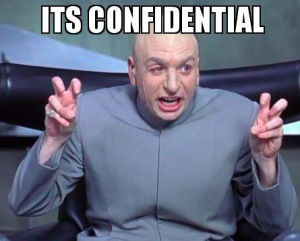The DTSA Ex Parte Seizure Provision Was Always Bad Policy–Janssen v. Evenus
In 2016, Congress enacted the Defend Trade Secret Act (DTSA). Among other provisions, it created a brand-new remedy, the ex parte seizure order, that allows trade secret owners to grab allegedly stolen trade secret items before they are spirited away from judicial process. The paradigmatic example on Congress’ mind was something out of the movies: the thief is making their hasty escape to the airport and legal safety, but the US marshals save the day by interdicting the thief just before they board the plane. In the real world, this happens never. Also, the ex parte seizure’s procedures cannot move quickly enough to stop an airport escape, so the provision could never actually redress its archetypical use case.
Trade secret owners have always had the ability to seek an ex parte TRO that could include item seizure to prevent dissipation or spoliation, so the ex parte seizure provision partially overlapped existing protections. However, as we know, courts routinely and predictably make errors when ruling on ex parte motions, so any additional legislative embrace of ex parte procedures is always fraught with peril.
In general, courts have taken seriously Congress’ instructions that a DTSA ex parte seizure is only appropriate in “extraordinary circumstances.” As a result, courts have rarely granted it (and it probably wasn’t needed or applicable even in those rare cases). Indeed, any time a trade secret owner requests a DTSA ex parte seizure, I assume that the plaintiffs are playing the legal system.
* * *
The case that prompts these musings involves the maker of “Yondelis,” a chemotherapy drug. The manufacturer patented the drug but keeps the “data, specifications, and methods for manufacturing the drug confidential.” A generic manufacturer sought FDA approval, and the Yondelis manufacturer sued them for patent infringement.
During discovery for the patent case, the Yondelis manufacturer found evidence suggesting trade secret theft, so it added a DTSA claim against the generic manufacturer. The Yondelis manufacturer further became convinced that the generic manufacturer was spoliating evidence. Thus, the Yondelis manufacturer sought a DTSA ex parte seizure order against the generic manufacturer.
You probably already spotted the problems with the Yondelis manufacturer’s seizure request, but let’s go through it explicitly.
The parties are already in litigation. The generic manufacturer is already under a litigation hold. Violating that hold will lead to adverse consequences in the litigation as well as possible criminal punishment. Plus, the parties are already engaging in disputes over discovery. With that context, it is usually unreasonable for one litigant to blindside its opponent with an ex parte demand.
Even if that weren’t true, there are existing mechanisms for discovery that the Yondelis manufacturer could use, including (if applicable) ex parte requests under the FRCP. The DTSA ex parte seizure provision wasn’t designed to be used when there’s already an existing lawsuit between the players. Most importantly, this plaintiff is asking the court to seize important items from its competitive rival–without giving the rival a chance to object (the whole point of an EX PARTE seizure). What could possibly go wrong with that?
The generic manufacturer may or may not have done nefarious things, but the facts in evidence in this opinion confirm that the Yondelis manufacturer is making some shady moves in court.
Fortunately, the district court rejected the DTSA ex parte seizure request. And then, a shocking twist in the movie’s third act: the Yondelis manufacturer appealed the seizure request denial.
First, in general, TRO denials aren’t appealable. They are only supposed to preserve the status quo until the court can review the case in an orderly fashion. The ex parte seizure isn’t a TRO per se, but it serves the same function with the same rationales.
 Second, the DTSA seizure proceedings are ex parte to keep them secret and avoid potential dissipation or spoliation. But if you’re appealing the denial, then it’s no longer a secret to the target, who now can dissipate/spoliate if they are so inclined to commit illegal acts, meaning the need for an ex parte remedy has completely evaporated. Maybe the trade secret owner is playing a clever game of 4D chess, but in a 2D world none of this makes sense.
Second, the DTSA seizure proceedings are ex parte to keep them secret and avoid potential dissipation or spoliation. But if you’re appealing the denial, then it’s no longer a secret to the target, who now can dissipate/spoliate if they are so inclined to commit illegal acts, meaning the need for an ex parte remedy has completely evaporated. Maybe the trade secret owner is playing a clever game of 4D chess, but in a 2D world none of this makes sense.
In an anodyne opinion, the appeals court says DTSA ex parte seizure requests aren’t appealable. According to Westlaw, this is the first time an appellate court has interpreted the DTSA ex parte seizure provision (18 USC 1836(b)(2)). Given the paucity of use cases for the seizure provision, it could possibly be the last appellate analysis we’ll get for the foreseeable future.
Regardless of the DTSA’s overall merits, the ex parte seizure provision never should have been included in the law, as confirmed by the data points from the past 7 years. For that reason, I believe the ex parte seizure provision remains a discredit to those who advocated for it.
Case Citation: Janssen Products LP v. Evenus Pharmaceutical Laboratories, Inc., 2023 WL 7036466 (3d Cir. Oct. 17, 2023)
Prior Blog Posts on the DTSA Ex Parte Seizure Provision
* This quick links re. All Star Recruiting Locums v. Ivy Staffing Solutions
* This quick links re. Magnesium Machine, LLC v. Terves LLC, where the allegedly misappropriated trade secret was 3 words long.
* Is the DTSA Ex Parte Seizure Provision Constitutional?
* This quick links re. Blue Star Land Services LLC v. Coleman)
* The DTSA’s Ex Parte Seizure Order: The “Ex” Stands for “Extraordinary” (Guest Blog Post)
* Another Court Rejects DTSA Ex Parte Seizure–Brunswick Rail v Sultanov
* Court Benchslaps Trade Secret Plaintiff and Counsel For Bad Faith Litigation–RBC Bearings v. Caliber
* Trade Secret Owner Penalized For ‘Specious’ Misappropriation Lawsuit–BTS v. Exclusive Perspectives
* The New ‘Defend Trade Secrets Act’ Is The Biggest IP Development In Years
* Do We Need A New Judicial Fast Lane To Combat Trade Secret Theft?
* Congress Is Considering A New Federal Trade Secret Law. Why?
* Ex Parte Seizures and the Defend Trade Secrets Act

